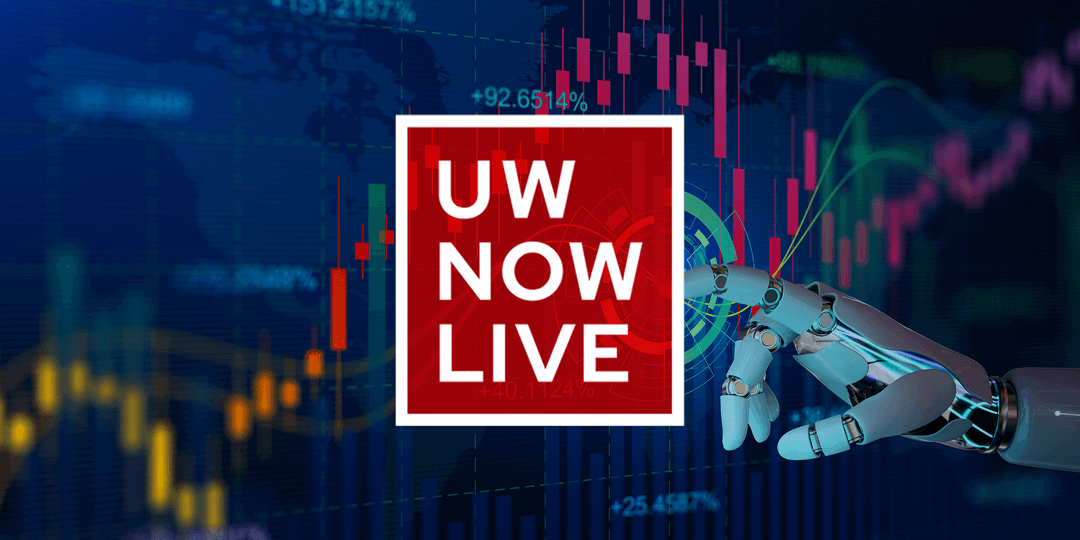President Trump has, since his first administration, shown an affinity for tariffs, taxes on imports. He imposed tariffs in 2018, and while running for president again in 2024, he declared tariff to be “the most beautiful word in the dictionary.”
However, warns UW economics professor Lydia Cox, tariffs are “a very blunt policy instrument. They have maybe some potential benefits for the industries that are being protected, but they create a lot of collateral damage.”
Cox joined political science professor Jon Pevehouse and Mike Knetter, the Wisconsin Foundation and Alumni Association’s senior adviser for investments and business development, for a discussion of tariffs on the UW Now Livestream on February 18. The discussion explained how tariffs work, the likely effects on businesses and consumers, and the ways in which the Trump administration’s tariffs — and threats of tariffs — might affect international relations.
Knetter, who hosted the conversation, began with a brief history of international trade and tariff policy. “Why is trade good?” he asked. “International trade and exchange is voluntary. … The presumption should be that voluntary exchange is good.”
He discussed trade imbalances and explained why they are less problematic than many people think. “International exchange is balanced in the aggregate,” he said, “and a trade deficit is always offset by a capital accounts surplus.” In the case of the United States, which has trade deficits with many nations, “the rest of the world’s residents are taking pieces of paper or bookkeeping entries, and we’re getting cars, steel, whatever it might be.”
Cox looked at the ways that tariffs affect industries beyond the product that is taxed. “When a tariff is imposed by the U.S.,” she said, “it is the U.S. importers — businesses or retailers that are importing the goods — that are responsible for actually paying the additional tax. The tariff isn’t paid by other countries; it’s paid by businesses and people in the U.S.”
She cited steel as an example. If an American company is importing steel at a cost of $700 per ton and then faces a 25 percent tariff, that company will pass the cost of that tax onto its customers. Then domestic American steel producers will raise their prices, which means that the companies that rely on steel for their products — manufactures of cars or heavy machinery — will face higher costs and pass those costs on to consumers, making them less competitive.
“The estimated number of jobs in steel-using industries outnumbers the number of jobs in steel-producing industries by about 80 to one,” Cox said, “which just means that for every worker that potentially benefits from steel tariffs, there are 80 workers in industries that will potentially be harmed by these higher steel costs.”
Pevehouse talked about the Trump administration’s rhetoric, which has often been belligerent about trade.
“Trump has been very clear,” Pevehouse said, “that there will be no exceptions to these tariffs. There will not be goods that are excluded. He will not bargain them away for anything but complete victory in this trade war.”
And yet in practice, the administration has been willing to delay tariffs for policy changes: Colombia being willing to accept deported migrants, for instance, or Canada agreeing to appoint a drug czar. But even this has potential downsides, Pevehouse said. It weakens the international trade system and angers allies, who appreciate the benefits of open trade. And other countries could “call [Trump’s] bluff and say, ‘Fine, put on 15, 20, 25 percent tariffs and watch your economy go into a tailspin.”
Knetter, Cox, and Pevehouse took questions from the live audience, many inquiring about potential benefits of tariffs — as a replacement for income tax revenue or as a means of boosting domestic industries. The speakers, however, felt the costs of tariffs outweigh potential positive results.
“Higher input costs actually make U.S. industries less competitive against foreign competition,” said Cox. “By protecting some industries, it actually becomes harder for other industries to operate.”



